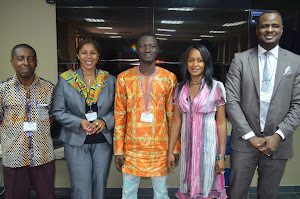 |
| Mr. Daniel Kabe |
A research on tariff setting mechanisms of water boards, has established that high electricity tariffs have become a bane to rural water delivery and thus are affecting access to potable water by rural communities in Ghana.
The study, which was conducted by Bosate Consulting, with Mr. Daniel Kabe as its Lead Researcher, also found out that in view of the continuous upward adjustment of electricity tariffs, many small town water systems, which are supposed to be self-sustaining, are operating at a loss.
Making this known at a validation workshop on the tariff setting research in Accra yesterday, Mr. Kabe said despite the high electricity tariffs that operators of the water systems have to pay each month, they are continually faced with a dilemma as regards the final cost of the water served the rural community, because members find it difficult to even pay the current rate of 5Gp for two size 34inch buckets, which is equivalent to US$4 per m³.
“The economic environment has major influence on the operations and management of the systems, especially the cost of power,” the Lead Researcher stated.
Adding to this, he disclosed that his five-man research team observed some District Assemblies as well as Water and Sanitation Board members do not pay their water tariffs and bills, which is compounding an already bad situation.
Mr. Kabe further divulged that 90% of the areas the team visited did not have their water meters working, which means no one can tell the volume of water dispensed, stating however, that operators of systems with the faulty meters did not express the desire to have them fixed.
To address barriers faced in tariff-setting, the research team recommended that “The principles of cost efficiency, cost recovery and economic efficiency applied should integrate an ability to exhibit flexibility to suit the particular rural context,” warning that where unwholesome sources of water are easily available, the high propensity of consumers to shift to these alternative sources when tariffs are high must cannot be ruled out.
The researchers also recommended that an assessment of the consumers’ ability and not willingness to pay, must be taken cognisance of, if the service is deemed as basic.
They also charged the Community Water and Sanitation Agency (CWSA) at the national level, through its supervisory Ministry of Water Resources, Works and Housing, to attempt a discourse with the Electricity Company of Ghana towards a flat rate or any formula that will reduce the burden of power cost on the water systems.
Further, Mr. Daniel Kabe and his team suggested that mother Ministries for defaulting public institutions, especially health, Police Service and the District Assemblies should be engaged in ministerial discourse on settlement of bills.
On policy design and decision making on tariff setting, the research report recommended that CWSA maintain minimal interference in tariff setting by water boards and district assemblies and define guidelines that will help the local authorities, the communities and the water boards to set up tariff rates, which are both socially and economically rational and self-sustaining.
As regards the sustainability of water systems, the research team suggested proper management of water sheds, subsidising of the cost of energy, classification of the small water system into the domestic category by the Volta River Authority (VRA) and remuneration for qualified staff.
In an interview, Mr. Kabe disclosed that for the month-long research, his team visited New Abirim in the Eastern Region, Tamale, Gushegu and Savelugu in the Northern Region, Bongo in the Upper East Region, and Gwollu in the Upper West Region.
Explaining why the research was conducted, Mr. Kabe said “WaterAid is interested in looking at the impact that the utility adjustment that the PURC announced recently is having on the poor – how they are coping with that – that’s the main essence.”
Commenting on the issue of tariff setting, Akwasi Ofori Amanfo, Secretary, New Abirim Water and Sanitation Development Board, said although his board has not set any tariff since 2004, the increase in electricity tariffs had necessitated that now, which action will be largely informed by many factors such as their ability to retrieve money owed them by many individuals.
He also spoke of irregular electricity power supply which hampers the distribution of water by their two interconnected pumping stations to their three overhead tanks and then to New Abirim and other communities around including Mamaso.
Touching on the report, he said even though many of the recommendations are already being practiced, it will serve as a reminder to his board.
In her opening remarks, Afia S. Zakiya, Country Representative for WaterAid in Ghana said “People who are the least endowed in financial resources are willing to pay for the water they use. This conversation is to make sure that it is done in an inclusive manner.”
“Poor people are willing to pay, so how do we determine prices that are fair and equitable?,” she asked, adding that access to potable water contributes to eradication of diseases and enhances child education.
For his part, Ibrahim Musah, WaterAid in Ghana, stated that his organisation finds validation essential because it is involved in advocacy. “We also want to get actionable recommendation plans,” he said.





No comments:
Post a Comment